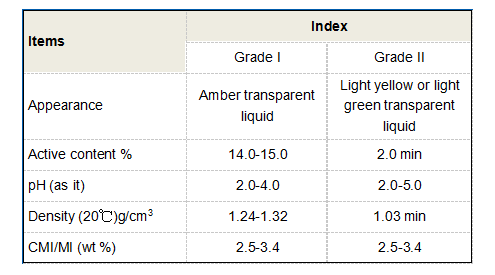Effective Strategies for Scale Inhibition in Water Treatment Systems
The Importance of Scale Inhibitors in Industrial Applications
Scale formation is a pervasive issue in various industrial processes, including water treatment, oil production, and heating systems. As water is heated or evaporated, dissolved minerals such as calcium, magnesium, and carbonate can precipitate and form solid deposits, commonly known as scale. This scale buildup can lead to significant operational difficulties, increasing maintenance costs and reducing efficiency. To combat this issue, scale inhibitors have emerged as essential chemical agents in many industries.
Scale inhibitors are specialized chemicals designed to prevent the formation and adhesion of scale on surfaces. They work through various mechanisms, such as crystal modification, dispersion of particles, and adsorption on scale-forming minerals. The most common types of scale inhibitors include phosphonates, polyacrylates, and phosphates, each offering distinct advantages depending on the application and water chemistry.
In water treatment facilities, scale inhibitors play a crucial role in ensuring the longevity and efficiency of equipment such as boilers, heat exchangers, and cooling towers. These systems are particularly vulnerable to scale formation because they often operate at high temperatures and pressures, where scale is more likely to form. By incorporating scale inhibitors into the water treatment regimen, operators can significantly reduce scaling, thereby enhancing energy efficiency and minimizing downtime for cleaning and maintenance. This, in turn, leads to substantial cost savings and improved system performance.
In the oil and gas industry, scale formation can pose significant challenges to production operations. In offshore oil fields, for instance, the presence of scale can block pipelines and reduce flow rates, leading to decreased production efficiency. Scale inhibitors are critical in this context, as they help maintain the integrity of production systems and optimize extraction processes. The use of these inhibitors allows operators to sustain higher production levels and reduce the frequency of costly interventions to clear blockages.
scale inhibitor

Apart from their technical benefits, the environmental impact of scale inhibitors cannot be overlooked. In many regions, water resources are limited, and industries are under pressure to adopt more sustainable practices. By reducing the frequency of equipment breakdowns and minimizing waste generated from cleaning operations, scale inhibitors contribute to a more sustainable approach to industrial water management. Furthermore, advancements in the development of eco-friendly scale inhibitors are ongoing, aimed at reducing toxicity while maintaining effectiveness.
In various applications, the choice of scale inhibitor must take into account several factors, including water chemistry, temperature, pressure, and the specific minerals present. For example, in high-hardness waters where calcium carbonate scaling is prevalent, phosphonate-based inhibitors may be more effective due to their strong affinity for calcium ions. In contrast, polyacrylate-based inhibitors are often preferred in varying pH conditions due to their ability to inhibit multiple scales.
Moreover, the effectiveness of scale inhibitors can be monitored and optimized through regular testing and analysis of the water chemistry. Industrial operators should constantly assess the scaling potential of their systems and adjust their scale inhibition strategies accordingly. This proactive approach ensures that the inhibitors are functioning effectively and that the risk of scale formation remains low.
In conclusion, scale inhibitors are indispensable in managing scale formation across various industries, from water treatment to oil production. They not only help maintain operational efficiency and reduce maintenance costs but also contribute to more sustainable industrial practices. As technology advances and the demand for eco-friendly solutions continues to grow, the development and application of innovative scale inhibitors will play a crucial role in securing a sustainable industrial future.
-
Water Treatment with Flocculant Water TreatmentNewsJun.12,2025
-
Polymaleic AnhydrideNewsJun.12,2025
-
Polyaspartic AcidNewsJun.12,2025
-
Enhance Industrial Processes with IsothiazolinonesNewsJun.12,2025
-
Enhance Industrial Processes with PBTCA SolutionsNewsJun.12,2025
-
Dodecyldimethylbenzylammonium Chloride SolutionsNewsJun.12,2025





